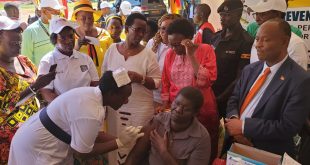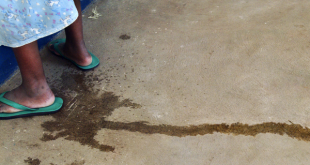Prevention and Vaccine Against Ebola In Uganda-CDC
By Goodluck Musinguzi
Ebola virus disease (EVD) is a very rare disease that can cause illness in people. It is believed to occur naturally in specific animal populations that live in multiple sub-Saharan African countries. In the areas where EVD is most common, Ebola virus is believed to spread at low rates among certain animal populations.
Occasionally people become sick with Ebola after coming into contact with infected animals, which can lead to Ebola outbreaks in people who come in contact with them or others who have EVD.
A vaccine is a biological preparation that stimulates immunity to a particular pathogen. A vaccine typically contains an agent that resembles a disease-causing microorganism and is often made from weakened or killed forms of the microbe or its toxins. The agent stimulates the body’s immune system to recognize it as foreign, destroy it, and ”remember” it, so that the immune system can more easily identify and destroy any of these microorganisms that it encounters later. The body’s immune system responds to vaccines as if they contain an actual pathogen, even though the vaccine itself is not capable of causing disease.
When living in or travelling to a region where Ebola virus is potentially present, there are a number of ways to protect yourself and prevent the spread of EVD.
- Avoid contact with blood and body fluids (such as urine, faeces, saliva, sweat, vomit, breast milk, amniotic fluid, semen, and vaginal fluids) of people who are sick.
- Avoid contact with semen from a man who has recovered from EVD, until testing shows that the virus is gone from his semen.
- Avoid contact with items that may have come in contact with an infected person’s blood or body fluids (such as clothes, bedding, needles, and medical equipment).
- Avoid funeral or burial practices that involve touching the body of someone who died from EVD or suspects EVD.
- Avoid contact with bats, forest antelopes, and nonhuman primates (such as monkeys and chimpanzees) blood, fluids, or raw meat prepared from these or unknown animals (bushmeat).
These same prevention methods should be used when living in or travelling to an area experiencing an Ebola outbreak. After returning from an area experiencing an Ebola outbreak, people should monitor their health for 21 days and seek medical care immediately if they develop symptoms of Ebola.
Ebola Vaccine
The U.S. Food and Drug Administration (FDA) approved the Ebola vaccine rVSV-ZEBOV (called Ervebo®) on December 19, 2019. This is the first FDA-approved vaccine for Ebola.
This vaccine is given as a single dose vaccine and has been found to be safe and protective against Zaire ebolavirus, which has caused the largest and most deadly Ebola outbreaks to date.
On February 26, 2020, the Advisory Committee on Immunization Practices (ACIP) recommended pre-exposure prophylaxis vaccination with rVSV-ZEBOV for adults ≥ 18 years of age in the U.S. population who are at potential occupational risk of exposure to Zaire ebolavirus. This recommendation includes adults who are
- Responding or planning to respond to an outbreak of EVD;
- Laboratorians or other staff working at biosafety-level 4 facilities that work with live Ebola virus in the United States; or
- Healthcare personnel working federally designated in the United States.
For healthcare providers looking for information about the Ebola vaccine and vaccinating ACIP-recommended groups, visit
A two-dose vaccine regimen of a different vaccine that was also designed to protect against the Zaire ebolavirus species of Ebola was used under a research protocol in 2019 during an Ebola outbreak in the Democratic Republic of the Congo. The two doses of this vaccine use two different vaccine components (Ad26.ZEBOV and MVA-BN-Filo) and the regimen requires an initial dose and a “booster” dose 56 days later. This vaccine has not yet been approved by the FDA for routine use.





Vaccination is the way to go